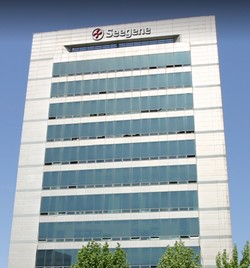Despite a surge in sales of non-Covid-19 products, Seegene, which saw sales spike over a trillion won during the Covid-19 pandemic, continued to report an operating loss in the third quarter of this year.

According to a public filing by the company last Friday, Seegene posted sales of 91.8 billion won ($69.3 million), down 39.1 percent from last year.
The company also reported an operating and net loss of 10 billion won and 4.6 billion won, which marked a 68.7 percent and 58.5 percent improvement in deficit compared to the same period last year.
Seegene has been facing hardship despite seeing record-high earnings in 2020 when the company reported sales of 1.12 trillion won and operating profits of 676.2 billion won due to the Covid-19 pandemic.
The company's meteoric rise followed in 2021, with the company again breaking record high sales with 1.37 trillion won.
However, Seegene's sales began to decline last year, with annual revenues dropping 38 percent to 853.4 billion won, and operating profits plummeting by 71 percent to 195.9 billion won.
As Seegene experienced rapid growth during the pandemic, the subsequent sharp decline in performance with the transition to an endemic phase presented a significant challenge for the company to overcome. During the pandemic, sales were heavily concentrated on Covid-19 products, overshadowing the non-Covid product line.
The silver lining in the third-quarter results was the continued increase in sales of non-Covid-19 products.
The public filing showed a 36 percent increase in non-Covid-19 product sales to 57.9 billion won compared to the same period last year, accounting for 63 percent of total sales.
Among non-Covid-19 products, respiratory bacterial (PB) diagnostic products and gastrointestinal (GI) comprehensive diagnostic products saw significant sales growth of 78 percent and 71 percent, respectively.
Seegene is planning to transform into a global molecular diagnostics distribution company through its mid-to-long-term business strategy, the technology-sharing business.
The strategy involves developing a variety of diagnostic products tailored to local conditions based on a standardized system worldwide and having local subsidiaries handle clinical trials and regulatory approvals to overcome human and material limitations.
To advance this business initiative, Seegene plans to establish local subsidiaries in partnership with leading companies in various countries.
This year, Seegene has already entered into business agreements with Hylabs in Israel and Werfen in Spain.
Meanwhile, Seegene's board decided on a quarterly cash dividend of 200 won per common share, scheduled for payment on Nov. 28.
Major shareholders, including CEO Chun Jong-yoon, and related parties hold a 31.14 percent stake as of the end of June. The dividend payout is expected to be around 29 billion won, with CEO Cheon Jong-yoon projected to receive approximately 17 billion won.
Related articles
- [Top K-Pharma Analysis ⑲] Seegene’ stock plunges to 1/9 of pandemic high
- Seegene's Q2 earnings decline but growth in non-Covid products expected
- Stock prices of Covid-19 diagnostic kit makers jump as infection resurges
- Angered by sluggish share prices, Seegene retail shareholders hold rally
- Seegene, Microsoft collaborate to advance molecular diagnostics solutions
- Seegene suffers sharp decline in profits amid shift to endemic phase of Covid-19
- [Photo News] UK Health Security Agency Chief Executive visits Seegene headquarters in Seoul

